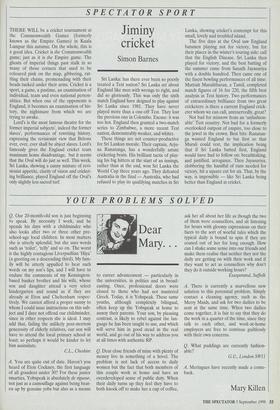SPECTATOR SPORT
Jiminy cricket
Simon Barnes
THERE WILL be a cricket tournament at the Commonwealth Games (formerly known as the Empire Games) in Kuala Lumpur this autumn. On the whole, this is a good idea. Cricket is the Commonwealth game; just as it is the Empire game. The ghosts of imperial things past stalk in so many of those corners that used to be coloured pink on the map, gibbering, rat- tling their chains, promenading with their heads tucked under their arms. Cricket is a sport, a game, a pastime, an examination of individual, team and even national person- alities. But when one of the opponents is England, it becomes an examination of his- tory, the nightmare from which we are trying to awake.
Lord's is the most famous theatre for the former imperial subjects', indeed the former slaves', performances of rewriting history, expressing the revisionist view that Britons ever, ever, ever shall be abject slaves. Lord's famously gives the England cricket team maximum home disadvantage, but it seems that the Oval will do just as well. This week, Sri Lanka, showing a canny mixture of revi- sionist appetite, clarity of vision and cricket- ing brilliance, played England off the Oval's only slightly less sacred turf. Sri Lanka: has there ever been so poorly treated a Test nation? Sri Lanka set about England like men with wrongs to right, and did so gloriously. This was only the sixth match England have deigned to play against Sri Lanka since 1981. They have never played more than a one-off Test. They lost the previous one in Colombo. Excuse: it was too hot. England then granted a two-match series to Zimbabwe, a more recent Test nation, demonstrably weaker, and whiter.
These things are not counter-productive for Sri Lankan morale. Their captain, Arju- na Ranatunga, has a wonderfully astute cricketing brain. His brilliant tactic of play- ing his big hitters at the start of an innings, rather than at the end, won Sri Lanka the World Cup three years ago. They defeated Australia in the final — Australia, who had refused to play its qualifying matches in Sri Lanka, showing cricket's contempt for this small, lovely and troubled island.
The five days at the Oval saw England batsmen playing not for victory, but for their places in the winter's touring side: call that the English Disease. Sri Lanka then played for victory, and the best batting of the summer came from Sanath Jayasuriya with a double hundred. Then came one of the finest bowling performances of all time: Muttiah Muralitharan, a Tamil, completed match figures of 16 for 220, the fifth best analysis in Test history. Two performances of extraordinary brilliance from two great cricketers: is there a current England crick- eter whom we can call, unreservedly, great?
Not bad for minnow from an 'unfashion- able' Test country. Not bad for a formerly overlooked outpost of empire, too close to the jewel in the crown. Best bits: Ranatun- ga wanted England to bat first so that Murali could rest, the implication being that if Sri Lanka batted first, England would have had to follow on: breathtaking, and justified, arrogance. Then Jayasuriya, clobbering the handful of runs needed for victory, hit a square cut for six. That, by the way, is impossible — like Sri Lanka being better than England at cricket.


























































 Previous page
Previous page